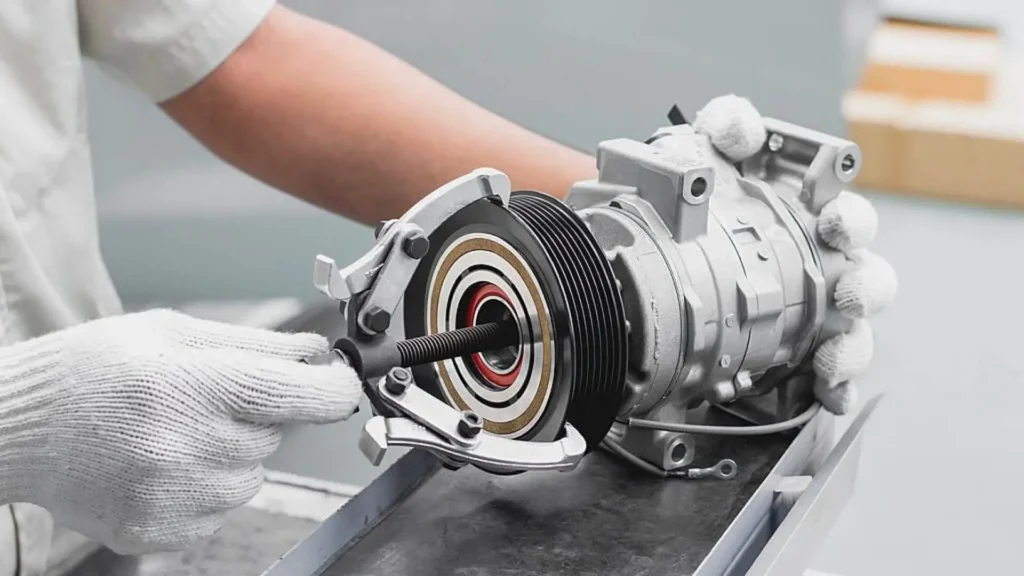Are you feeling the heat inside your car, but your air conditioning system is failing to cool things down? You need to know the symptoms of a bad AC compressor.
When the AC compressor starts to go bad, it can have a detrimental impact on your car’s cooling system. But what exactly are the signs that indicate a faulty AC compressor?
Well, buckle up, because in this discussion, we will uncover the common warning signs that you should be on the lookout for. From strange noises to weak airflow, we’ll explore how these symptoms can point to a malfunctioning AC compressor and what steps you can take to address the issue.
So, let’s dive in and discover the clues that your AC compressor might be giving you.
What Does an AC Compressor Do?
The AC compressor is a vital component of your truck’s cooling system, responsible for pressurizing and circulating the refrigerant needed to cool the cabin air. It plays a crucial role in maintaining a comfortable temperature inside your truck, especially during hot summer days.
When you turn on the AC, the compressor engages and starts compressing the refrigerant gas, converting it into a high-pressure, high-temperature state. This compressed refrigerant then flows through the system, releasing heat and cooling down as it moves.
As it reaches the evaporator, it expands and absorbs heat from the cabin air, resulting in the desired cooling effect. If your AC compressor malfunctions, it can lead to a lack of cooling or even complete AC failure.
In such cases, it’s recommended to seek professional assistance from semi truck repair shop, or mobile truck repair services to diagnose and fix the issue promptly.
Where is the Air Compressor on a Semi Truck?
Located near the engine, the air compressor on a semi truck is a crucial component responsible for pressurizing the air needed for various systems, including the brakes and suspension. The air compressor is typically mounted on the side of the engine block, close to the front of the truck.
It’s connected to the engine through a belt and pulley system, which allows it to be driven by the engine’s power. The compressor takes in air from the environment and compresses it, increasing its pressure before sending it to the air tanks. These tanks store the pressurized air and distribute it to the different systems as needed.
It’s important to regularly inspect and maintain the air compressor to ensure proper functioning of the truck’s systems.
How to Tell if an AC Compressor is Bad?
To determine if your AC compressor is bad, there are several signs you can look out for.
First, if no cold air is coming from the vents, it could indicate a problem with the compressor.
Additionally, if you notice sudden cold air that warms up rapidly or hear unusual compressor sounds like clicking or screeching, these are also red flags.
Other signs include damaged suction lines, coolant emissions near the compressor, or a burning odor coming from the compressor section.
No cold air is coming from the vents. Sudden cold air that warms up rapidly
If you’re not feeling any cold air coming from your vents and the sudden cold air that does come out quickly warms up, it could be a sign of a faulty AC compressor. The AC compressor plays a vital role in the cooling process of your vehicle’s air conditioning system. It’s responsible for compressing the refrigerant gas and circulating it through the system, allowing for the transfer of heat and the production of cold air.
When the compressor isn’t functioning properly, it can result in a lack of cold air being emitted from the vents. Additionally, if the cold air that does come out quickly warms up, it suggests that the compressor is struggling to maintain the desired temperature. In such cases, it’s recommended to have your AC compressor inspected and repaired by a professional to ensure proper cooling performance.
Unusual compressor sounds, such as clicking or screeching.
If you hear unusual compressor sounds, such as clicking or screeching, it may indicate that your AC compressor is faulty. These sounds aren’t normal and could be a sign of a serious problem.
Clicking noises often occur when the compressor is struggling to start. This could be due to a faulty electrical component or a worn-out motor.
Screeching sounds, on the other hand, can indicate a problem with the compressor’s bearings or a refrigerant leak.
It’s important not to ignore these sounds as they can lead to further damage to your AC system.
If you notice any unusual compressor sounds, it’s recommended to contact a professional truck cooling expert to diagnose and repair the issue.
Damaged Suction Lines
One common sign of a bad AC compressor is damaged suction lines, which can be identified through visual inspection and pressure testing.
Suction lines play a crucial role in the cooling system as they carry refrigerant from the evaporator to the compressor. When these lines become damaged, it can lead to a decline in the system’s performance.
During a visual inspection, look for any visible signs of damage such as cracks, dents, or leaks in the suction lines.
Additionally, pressure testing can help identify any issues. By connecting a pressure gauge to the suction line, you can check if the pressure is within the recommended range. If the pressure is significantly low, it could indicate a problem with the suction lines and a potential compressor failure.
Emissions of coolant were found near the compressor.
Emissions of coolant near the compressor indicate a potential issue with the AC compressor’s functionality. Coolant, also known as refrigerant, is a crucial component in the air conditioning system as it absorbs heat from the cabin and cools the air before it circulates back. When coolant leaks near the compressor, it suggests a possible failure in the compressor seals or valves. This leakage can result in reduced cooling performance and inefficient operation of the AC system.
If you notice coolant leaking from your AC compressor, it’s a clear sign that something is wrong. It’s important to address this issue promptly to prevent further damage and ensure optimal cooling in your vehicle. Seeking professional assistance from a certified technician is recommended to diagnose and repair the problem accurately.
A burning odor is coming from the compressor section.
When a burning odor emanates from the compressor section, it’s a clear indication of a potential issue with the AC compressor’s functionality. This burning smell can be caused by a number of factors, including overheating of the compressor motor or electrical components. It’s important to address this issue promptly, as it can lead to further damage and potentially render the AC compressor inoperable.
Burning odors can be a sign of a failing compressor clutch or a seized compressor. In some cases, a burning smell may also indicate a refrigerant leak, which can be hazardous to both the AC system and your health. If you notice a burning odor coming from the compressor section, it’s advised to consult a professional technician to diagnose and resolve the issue.
How Much is an AC Compressor?
The cost of an AC compressor can vary depending on various factors such as the make and model of the truck, the brand of the compressor, and where it’s purchased from. On average, the price range for a new AC compressor can be anywhere from $200 to $800, excluding the cost of labor for installation.
However, it’s important to note that these prices can fluctuate based on the specific needs of your truck and the quality of the compressor you choose. It’s recommended to consult with a professional cooling expert or mechanic to determine the best AC compressor for your truck’s cooling system and to get an accurate estimate of the total cost.
Additionally, you may be able to find lower prices by comparing prices from different suppliers or considering refurbished or remanufactured compressors, although this may come with certain risks and limitations.
Will a Bad AC Compressor Affect the Engine?
A faulty AC compressor can potentially impact the engine’s performance and efficiency. When the AC compressor fails, it can create an additional load on the engine, causing it to work harder and consume more fuel. The compressor is driven by the engine’s serpentine belt, so any issues with the compressor can affect the belt’s operation and increase the engine’s workload.
Moreover, a bad AC compressor can also lead to overheating of the engine. The compressor helps cool down the engine by circulating refrigerant through the AC system’s condenser. Without proper cooling, the engine can overheat, resulting in potential damage and decreased performance.
Therefore, it’s essential to address any issues with the AC compressor promptly to ensure optimal engine performance and efficiency.
Truck AC Compressor Not Turning On
If your truck’s AC compressor isn’t turning on, it may be due to a malfunction in the electrical system. The AC compressor plays a crucial role in cooling the air inside your truck’s cabin. When it fails to turn on, it can be a frustrating experience, especially during hot weather.
There are several possible causes for this issue. One common reason is a blown fuse or a faulty relay. These components control the flow of electricity to the AC compressor. Another possible cause is a malfunctioning pressure switch. This switch is responsible for detecting the refrigerant pressure and turning on the compressor accordingly. Additionally, a faulty clutch or a broken wiring connection can also prevent the AC compressor from turning on.
To diagnose and fix the issue, it’s recommended to consult a professional truck cooling expert to ensure a proper resolution.
What is the Cost of an AC Compressor Replacement?
When faced with a truck AC compressor that isn’t turning on, it’s crucial to consider the potential cost of an AC compressor replacement.
The cost of replacing a truck AC compressor can vary depending on various factors, such as the make and model of the truck, the type of compressor needed, and the labor costs involved.
On average, the cost of a truck AC compressor replacement can range from $500 to $1,500. This includes the cost of the compressor itself, which can range from $200 to $800, and the labor costs, which can range from $300 to $700.
It’s important to note that these are just average estimates, and the actual cost may vary depending on the specific circumstances. It’s recommended to consult with a professional truck AC technician to get an accurate cost estimate for your specific situation.
Final Words
In conclusion, it’s essential to address any issues with your truck’s AC compressor promptly to avoid further damage and costly repairs. Neglecting a bad AC compressor can lead to a breakdown of the entire cooling system, leaving you stuck in the scorching heat.
If you notice any of the symptoms mentioned earlier, such as warm air blowing from the vents, strange noises, or leaks, it’s crucial to take immediate action. Ignoring these signs can result in more extensive damage, requiring a complete replacement of the AC compressor, which can be expensive.
Regular maintenance and inspections can help identify any potential issues early on, saving you from unnecessary headaches and expenses. Remember, taking care of your truck’s AC compressor ensures optimal performance and a comfortable driving experience.
Particularly, paying close attention to compressor problems and ensuring timely repairs are made. The knowledgeable team at Discount Diesel, offering convenient mobile truck repair services, suggest being vigilant about recognizing common signs of AC compressor issues in semi-trucks.



